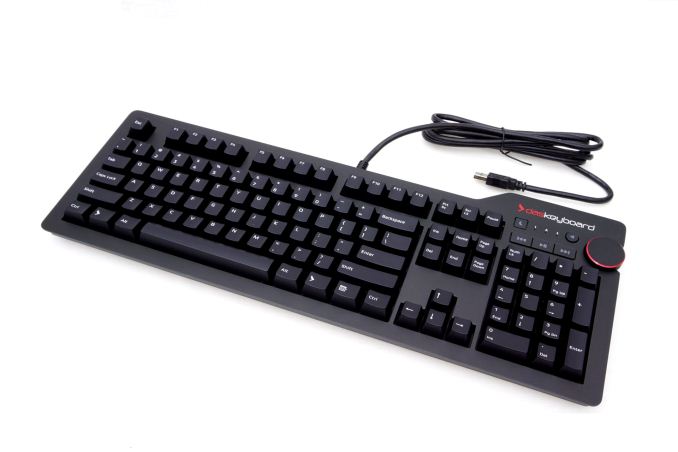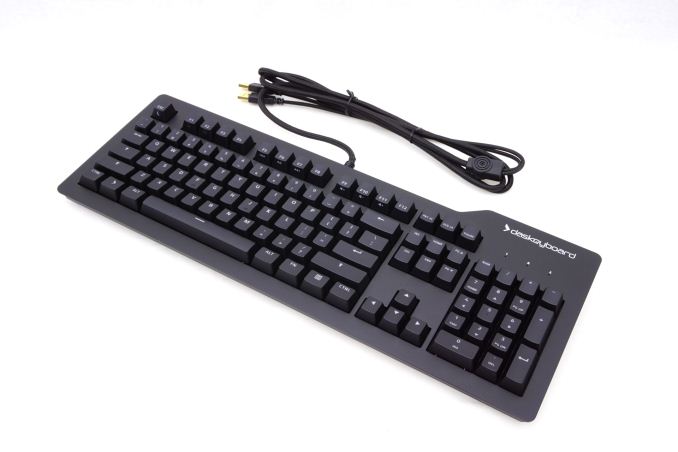The Das Keyboard 'Prime 13' & '4 Professional' Mechanical Keyboard Review
by E. Fylladitakis on January 10, 2017 8:00 AM ESTConclusion
In this review we had a look at the new Das Keyboard Prime 13 and the popular Das Keyboard 4 Professional. The keyboards do share a similar appearance and the same quality mechanical switches from Cherry but, to our eyes, each keyboard is targeted towards an entirely different group of users.
The Das Keyboard 4 Professional is a mechanical keyboard that has been clearly designed with professional users in mind, with the company forthrightly marketing it as such a product. Conscious professionals need devices that are aesthetically elegant, productive and durable. We cannot claim that the Das Keyboard 4 Professional will increase your productivity any more than any other similar mechanical keyboard, yet we can state with certainty that it is a very high quality product that will easily last a decade of heavy daily use. The USB 3.0 hub is a useful thing to have, especially in an office environment where devices like flash drives are frequently used.
With its intended primary target group being conscious professionals and office workers, we feel that the Das Keyboard 4 Professional is a perfect match for a modern workspace. We can only negatively comment the lack of programmability, which will be an issue for certain categories of professionals. For example, programmers tend to reprogram certain keys to insert ready, frequently repeating code and CAD users to perform certain repetitive functions. It is an expensive product, yet not overly so for a top tier professional keyboard. Its primary competition is primarily coming from the Cherry MX Board 6.0, a slightly more expensive professional keyboard with backlighting, but also lacks the sound volume knob and the USB 3.0 hub.
A quick glance can easily lead someone to the conclusion that the Das Keyboard Prime 13 is practically the same keyboard as the Das Keyboard 4 Professional, but that would not be a very accurate statement. The company still markets the Prime 13 as a keyboard to "get the job done", hinting that professionals still are a focus group of this keyboard. However, the marketing phrasing and the changes from the Das Keyboard 4 Professional hint that the company is trying to target a wider audience. This becomes clear when one notices that the company is trading features that can be of use in a strictly professional environment (the USB 3.0 hub, the extra buttons, and even the ruler) with LED backlighting, a feature that is generally found appealing by gamers and home users. The inclusion of the keycap puller and the use of Cherry cross-type stabilizers also hints that the designer intended for the user to be capable of removing/replacing the keycaps, something clearly not taken into account during the design of the Das Keyboard 4 Professional.
In our opinion, the Das Keyboard Prime 13 is having a bit of an identity crisis. Due to the proximity of its price to the Das Keyboard 4 Professional, a professional user would almost certainly buy the 4 Professional instead. For home users and gamers, the Prime 13 may be a keyboard of outstanding quality, yet there are several competitive products based on Cherry MX switches, with backlighting, that sell for less than $150. Many of them are offering features useful for gamers, such as extra macro keys and full-layout programmability, which the Prime 13 is lacking. The Das Keyboard Prime 13 could become an excellent choice for users that want a very high quality keyboard for their all-around home PCs, especially for professionals that work from home, but lower retail prices are needed to make it a truly competitive product.












58 Comments
View All Comments
Lolimaster - Tuesday, January 10, 2017 - link
For example, my logitech media keyboard (membrane) uses painted characters but the keycaps and plastic case and it stays the same color (black, means no clear ABS)Murloc - Wednesday, January 11, 2017 - link
what if I don't care about the paint chipping as long as it works?Krause - Wednesday, January 11, 2017 - link
Then you're clearly not looking for a high end mechanical keyboard.AlexanderTheSexy - Wednesday, January 18, 2017 - link
For an actual high end mechanical keboard, you would have to look at the original high end keyboard from IBM. The model M. Build like a tank, and still sought after by many. Fetching prices of around $100-400. You can find more information on this page: http://www.clickeykeyboards.com/Nowadays, there is a newer model build by http://www.unicomp.com/.
Honestly, once you get used to typing on such a keyboard, you never go back. Just give it a try.
Lolimaster - Tuesday, January 10, 2017 - link
My rubber logitech media keyboard has 0 issues being my daily companion for near 10years.buxe2quec - Wednesday, January 11, 2017 - link
Look, I have two mechanical keyboards, one at home and recently another one at work.We all know that rubber keyboards don't last as long, but we'll know that 1 million key presses are already more than enough and the 50 millions of mechanicals are not a REAL need or advantage (unless maybe you are in harsh environments like industrial? maybe!).
We buy mechanical for the feeling and for the noise.
Someone also for performance in gaming (not me) and someone else for status (again not me, but read the internet and you see it immediately).
Membrane keyboards last forever (unless they are 5 dollar a piece) and are fine for almost everyone.
Still, the feeling and sound of mechanicals makes me feel good :)
Not a need.
Jetpil0t01 - Sunday, January 15, 2017 - link
Perfect example would be any of the Razer Blackwidow boards, custom switches rated to 80 million presses... But the braided USB cable reliably frays and breaks inside 6 months and its not a spare they sell. Also the LEDs aren't rated to last anywhere near that long, so it's all really just marketing when it comes down to it.Really you should be buying a board based on size, USB hub, media controls and wrist wrest, not switches or longevity. That's coming from someone who has purchased everything from Das and Cherry boards all the way down to cheap Indian and Chinese "fake" boards and really the typing experience and durability has very little to do with price.
Washuai - Monday, January 23, 2017 - link
Speak for yourself. I got into mechanical keyboards, because I was annoyed by replacing membrane keyboards that kept having keys that stopped actuating. I am nice to my hardware ( well outside of something about my fingers wearing not just letters off, but grooves in cheap plastic keys). Keys stopped working on a so called indestructible silicon roll up, board I liked. I was tired of stuff that kept failing and dug in with research and found mechanicals. Honorable mention to compaq membrane board I bought in emergency as was only thing available for sale; That one did not die, but was not what I wanted, still have it, just in case.Quiet typing and changing ergonomic needs, mean I probably will never go back to membrane. I do measurably better wpm on mechanical, while my wrists and forearms thank me for lighter touch actuation.
On an expensive keyboard ( or even just office work horses), who wants some keys that stop being legible in a year? A blank keyboard looks better than that.
I don't mind blank, but I've learned I'm in the minority. Businesses actually need labeled boards. Replace a heavy traffic keyboard with one with blank keys and observe. The results will surprise you and you will have pranked.
BrokenCrayons - Wednesday, January 11, 2017 - link
It's true, durability is a non-reason for purchasing a mechanical keyboard. It's more like a checkbox feature used by marketing departments to help people feel justified in spending 20x more than necessary to get a keyboard for their computers. The same is true of proclaimed performance benefits in computer games that simply cannot be measured or proven valid.The bottom line is that mechanical keyboards exist in the present time because they can be sold for a higher profit due to customer perception that's been built partly on nostalgia for older generations of such keyboards (IBM Model Ms, for example) and partly on the mythology invented by marketing departments. Their increased margins are all the excuse a company needs to produce and sell a $200 keyboard.
I write novels and other lengthy works of fiction (mostly fluff and source material for RPG worlds) and have done so on membrane and mechanical keyboards. The membrane boards I use last just as long and even if I only got 2 years of use out of each one, at $10 each, they'd be a far better value than a $100-200 mechanical keyboard that worked for ten years.
However, pointing that out will just stir the pot up because people who have purchased mechanical keyboards will naturally seek to avoid negative feelings. It's fundamentally human to seek good feelings and the average mind will simply find a way it thinks is rational that refutes your claims.
maximumGPU - Thursday, January 12, 2017 - link
sorry that's not entirely accurate. it's not all customer perception. I don't have any nostalgia for an IBM model (never owned one) and don't care longevity or other marketing crap. I tried a mechanical keyboard and its biggest advantage is the nicer typing feel. The presence of an actuation point on certain variants means i don't have to bottom out the keys, and can therefore type faster and lighter. And therefore it feels nicer. in that regard it's objectively better and i didn't have to perform various mental tricks to rationalize it.I'm certainly not in the minority here either.